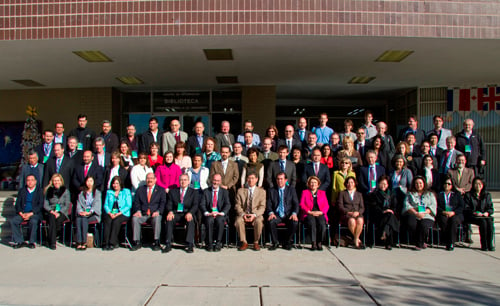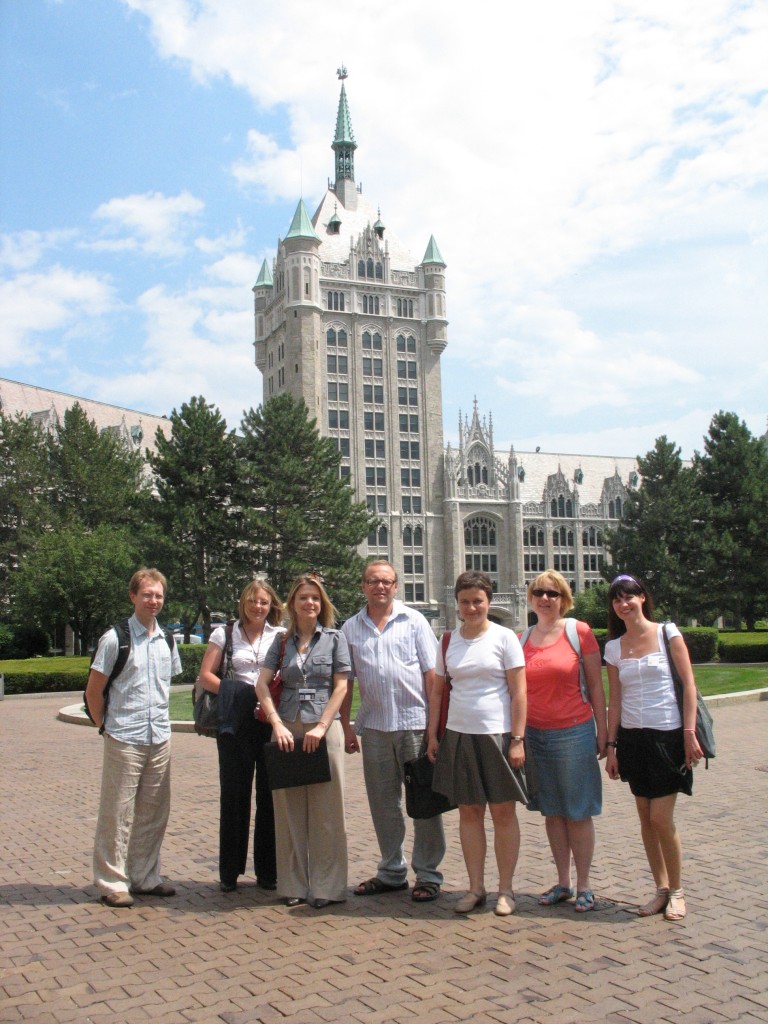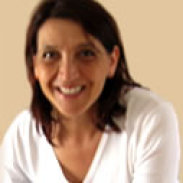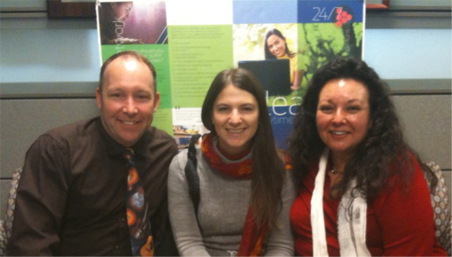
75 experts from 22 countries meet to discuss "What Works? in managing quality teaching in higher education.
I had the opportunity to represent SUNY, the SUNY Learning Network and the SUNY Office of International Programs at the Organisation for Economic Co-operation and Development‘s (OECD) Institutional Management in Higher Education (IMHE) “What Works” conference.
OECD (located in Paris, France) is an international organization with 34 member countries from North and South America to Europe and the Asia-Pacific region dedicated to global development and to promote policies that will improve the economic and social well-being of people around the world.
IMHE is the higher education directorate for OECD. IMHE members are comprised of higher education institutions and ministries from around the globe. The organization is dedicated to institutional capacity building and every five years they focus on three main themes. Two of the themes are particularly relevant to SUNY right now: quality teaching and internationalization. The IMHE project on Quality in Teaching has been exploring how institutions around the world define and support the quality of faculty, pedagogy, learning environments, student support and other determinants contributing to successful student achievement. This project, which began in 2007, culminated with the 2011 “What Works” Conference, held in Mexicali, Mexico on 5-6 December 2011, hosted by CETYS University and co-organized with IMHE and CONAHEC.
My participation in this conference was facilitated by Mitch Leventhal, the SUNY vice chancellor for global affairs, and Jason E. Lane, SUNY Albany associate professor in the Department of Educational Administration and Policy Studies (EAPS) and co-founder of the Cross-Border Education Research Team (C-BERT), who are interested in positioning SUNY as the lead US institution in the IMHE network. Next year (April 12-13, 2012) SUNY is co-sponsoring an international conference on Internationalization for Job Creation and Economic Growth with OECD on the topic of internationalization and higher education.
SUNY representation at the conference in Mexico was an opportunity for SUNY to engage with the organization and further solidify SUNY’s relationship with them. Conference presentations were by invitation of the conference organizer, IMHE’s Fabrice Hénard. Taking into consideration the theme of the conference, I provided @FabriceHENARD with 2 presentation options and was delighted when he asked if I would consider doing them both. This was a great opportunity to showcase SUNY and the SUNY Learning Network.
Presentation 1: Online Learning: Keys to Success of the SUNY Learning Network
slides: http://www.slideshare.net/alexandrapickett/online-learning-keys-to-success-of-the-suny-learning-network
handout: http://www.slideshare.net/alexandrapickett/sln-5-key-elements-of-success
This was a panel presentation expertly moderated by George Bonilla, Academic Director of the CETYS University Tijuana Campus. The question for the panel was, How to lead and manage the implementation of quality teaching within the institution? And specifically, what technologies foster quality teaching. Lorraine Stefani, the director of the Centre for Academic Development (CAD) from University of Auckland, New Zealand joined the panel via videoconference.
Presentation 2: Teaching and Learning in the Cloud
For the second presentation, I worked directly from links posted on my blog. In the presentation I used my own online instruction to initiate a conversation about how to catalyze, support, scale, maintain, and sustain innovative technology-enhanced quality teaching at the institutional level.
Agustí Cerrillo, the Director of the Law and Political Science Department at the Open University of Catalonia (UOC) in Spain led the panel in presentations on bringing Quality teaching initiatives into force – Using ICT for quality teaching, which included Anita Virányi, assistant lecturer from ELTE University in Hungary.
My conference reflections
The conference began with welcomes and opening remarks from Fernando Leon Garcia, president of the CETYS University System and of CONAHEC, and Richard Yelland, head of the Education Management and Infrastructure Division in the Directorate for Education at the OECD, which manages both the Programme on Institutional Management in Higher Education (IMHE) and the Centre for Effective Learning Environments (CELE).
The first plenary session of the conference was delivered by Amy Tsui, Pro-Vice-Chancellor and Vice-President of the University of Hong Kong, in Hong Kong, China, and titled Achieving Quality Teaching in the Context of Overall Quality Assurance Policies.
Amy started out with the following provocative questions: what is quality? and who determines quality teaching? How is it assessed? Are surveys valid? Are students even able to assess quality teaching? –and finally, from the professors perspective, “Why don’t you just leave me alone?!”
Amy asserted that in this discussion of quality teaching there are competing discourses & practices.
- quality=large/comprehensive/elitist institutions
- quality=pursuit of excellence
- quality=client (student) satisfaction
- quality= course objectives are fulfilled
In China, she went on to say there has been a shift from classroom-based quality teaching (QT) to quality assurance (QA) and the conundrum of QT in QA. She said that managing change and QA is a triangulation of quantitative and qualitative data, requiring data transparency, ownership of data, and follow-up-closing the loop.
The second plenary session was delivered by Alenoush Sorayan, Professor and Chair of the Department of Educational and Counseling Psychology at McGill University in Montreal, Quebec Canada, – who reported on the Lessons Learned from the OECD Institutional reviews on Quality Teaching in Higher Education
Following the Phase 1 report on the quality of teaching in higher education, Phase two (2010-11) was aimed at helping institutions explore their institutional engagement into quality teaching through individual reviews to:
• Develop and analyze current quality-led initiatives on teaching improvement
• Investigate the perception of faculty and students towards supporting quality teaching initiatives
• Further explore the link between teaching and learning
• Investigate the ways to evaluate the impact of teaching
The essential elements of quality teaching are an institutional commitment where sustained and non linear efforts are necessary There must also be an acknowledged need, evidence of effectiveness of initiatives, and certain synergies. She cited that the ways to support quality teaching involved providing structures and supports, incentives, curriculum-related projects, quality assurance processes and innovations. She reported that they found a “yearning for international leadership for quality teaching”, positioning higher education institutions as dynamic learning organizations with a responsiveness to consequences, and incentives -as common themes in the Phase 2 reviews. Additional themes included a focus on the requisite competencies of graduates, the multi-dimensional nature of QT, and the dynamic unquantifiable thresholds and tensions between corporate and collegial cultures. They found common drivers of quality teaching at the institutions where they conducted reviews that included internationalization, innovation, relevance to the student (problem-based learning, problem-based environments), equity, rewards, and promotion, dissemination, a shared institutional vision, sustainability, imagination, and those initiatives that were resource-balanced. In short, quality teaching, they found, is a pillar of the institution that supports a culture of evidence and a global awareness with a focus on students (student engagement, student experiences, timely completion and student success), a focus on professors (and their 21st century skills, new pedagogies and assessments, ongoing professional development, and continuous improvement). The required elements for quality teaching are: data on student performance, systematic professional development for faculty, and strong leadership to empower administrators Support networks, knowledge sharing, and research are also required.
I had the opportunity to talk with Fabrice Hénard, and to introduce myself to Richard Yelland, head of the Education Management and Infrastructure Division (Directorate for Education), and to learn more about IMHE and OECD (oecd.org/department/0,3…), and about the AHELO project. I learned that SUNY’s membership in IMHE is via the University at Albany, and Richard mentioned the upcoming joint OECD/SUNY International Conference on internationalization for job creation and economic growth oecd.org/edu/imhe/whatw… during his talk on the IMHE Secretariat.
– Universities: to assess and improve their teaching.
– Students: to make better choices in selecting institutions.
– Policy-makers: to make sure that the considerable amounts spent on higher education are spent well.
– Employers: to know if the skills of the graduates entering the job market match their needs.
Fabrice attended my second presentation and we chatted throughout the conference. He informed me about the upcoming IMHE General Conference 2012, Attaining and Sustaining Mass Higher Education, September 17-19, 2012 and suggested that I submit a proposal.
Who I met
I learned about life in Finland from a self-proclaimed “unusual Fin”, Vesa Taatila, with the wonderfully enigmatic title of special advisor to the president of Laurea University of Applied Sciences. He is an amazing ball room dancer (which we witnessed at the conference dinner), has a lovely wife who is into fine hand crafts, and a son that is into gaming. He does not eat reindeer or salmon, which he says are fed to tourists, he fears most animals, is not depressed, and enjoys British humor, which he attempts often with very amusing results. : ) From Vesa I learned about the upcoming Conference on Creativity in Higher Education Learning by Developing – New Ways to Learn, which will take place on May 8th – 11th, 2012, at Laurea’s Leppävaara unit in Espoo, Finland.
I met Jean-Pierre Blondin and Roch Chouinard, both associate vice-rectors from the Université de Montréal I met them with Vesa in San Diego and enjoyed the road to Mexicali with them.
It was interesting to hear from Denis Berthiaume, director of the Center for Teaching and Learning from the Université de Lausanne, in Lausanne, Switzerland about about his work and our similar experiences in supporting faculty in technology-enhancing instruction and learner-centered instructional design.
I was very honored to meet Dr. Gulsun Saglamer, the former rector of Istanbul Technical University, Turkey, and thrilled to learn that she established joint degree programs and double diplomas with SUNY Binghamton, New Paltz, FIT, Buffalo, and Meritime!
I had the most excellent conversations about online faculty development and effective practices in online learning design with Patricia Lecuona Valenzuela (and her colleagues Oralia Ferreira and Maria Eugenia Hernández), the director of instructional services at the Universidad Anáhuac, in Huixquilucan, Mexico.
I had a very enjoyable lunch learning more about the Universitat Oberta de Catalunya (the Open University of Catalunya), “the best online university in the world!” according to Julieta Palma (my new friend who shares my passion and enthusiasm for the social web and online learning) and my co-presenter Agustí Cerrillo, UOC director of the law and political science department. See a UOC news report of our presentation here. Julieta is the, director of the Latinoamérican Campus of the Open University of Catalunya.
Chile was very well represented at this conference and to my great surprise met and spent time talking with Aldo A. Ballerini A., the Academic Vice-president of the University of Bío Bío in Chile, (who happens to be my friend Marlene Muñoz Suplevida’s boss). Bío Bío, was one of the universities I visited a couple of years ago and where I had the opportunity to address a roundtable of professors in Spanish for the first time! I also had very enjoyable conversations with Sonia Bralic and Magdalena Jara, both from the Universidad Diego Portales in Santiago, Chile.
Raul Romero, a professor of psychology at CETYS, was a very interested attendee at both of my presentations, and was very enthusiastic to learn more about online teaching.
Ray Land, currently professor of higher education from the University of Strathclyde in Glasgow, Scotland, attended my presentation and expertly led our working group to identify barriers to quality teaching in their institutions and suggest improvements and examine how to measure effectiveness, progress, and the impact of quality teaching in their institutions.
I met Cynthia Davis, the associate dean of academic affairs from the University of Maryland University College – the only other American at the conference, who interestingly enough lived at one time in Schenectady, NY. It was great to get an update from her in her plenary presentation on online teaching and learning at UMUC.
I had a great conversation on the trip back to San Diego about online learning with Cynthia Davis, Gulsun Saglamer, and Associate Professor Peter Mederly, advisor to the minister of education of the Slovak Republic and Libor Voráz, president of the Slovak Rectors’ Conference.
I learned where Estonia is from Mart Noorma, where he is the vice dean for technical studies and associate professor of technology at the University of Tartu, in Estonia.
I also had the pleasure of meeting and speaking with Brenda Leibowitz, the director for the center for teaching and learning at Stellenbosch University in Cape Town, South Africa.
This was an excellent conference, very informative, well-organized and coordinated. I especially appreciated the attention to detail in the travel arrangements.




